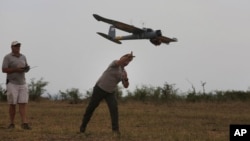Zimbabwe and Malawi are allowing flights by anti-poaching drones as part of an initiative supported by Google and the WWF conservation group.
The drones, which resemble large model airplanes, have flown in South African wildlife areas and are part of the Air Shepherd program of the U.S.-based Lindbergh Foundation. They can act as a highly visible deterrent to poachers fearing capture, though vast and rugged terrain as well as legal and bureaucratic obstacles have hampered some anti-poaching drone projects in Africa.
Officials in Zimbabwe acknowledge their anti-poaching efforts are in “desperate trouble” and view drones as a potentially effective tool to protect elephants and other species that are a pillar of the country's faltering tourism industry, Otto Werdmuller Von Elgg, operator of the Air Shepherd drones, said Friday.
One drone team plans to start operations next week in Hwange National Park, Zimbabwe's biggest reserve, said Von Elgg, director of the South African drone company UDS.
Some poachers in Hwange have used cyanide to poison elephants in large numbers before cutting off their tusks. Wildlife officials in Zimbabwe lack sufficient funding and say they need more rangers to patrol the nation's parks.
Von Elgg's drones started flying this month in Malawi's Liwonde National Park, which is surrounded by densely populated settlements. African Parks, the Johannesburg-based group that runs Liwonde, has been relocating some Liwonde elephants to a more secure reserve in Malawi.
The drones in Malawi can be used to chase straying elephants back into the park, as well as monitor illegal loggers who infiltrate Liwonde by riverboat at night, according to Von Elgg.
The drone project is backed by WWF, which is using a $5 million grant from Google to support the use of technology in countering wildlife crime.
Zimbabwe, Malawi Welcome Anti-poaching Drones

JOHANNESBURG —



